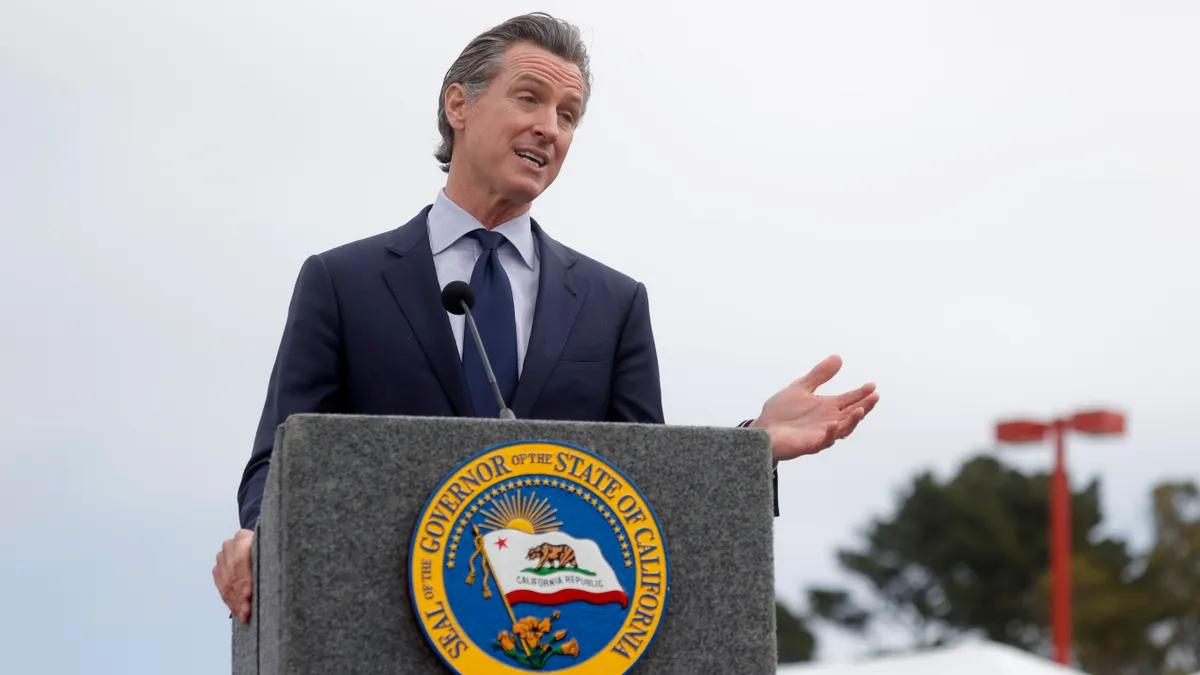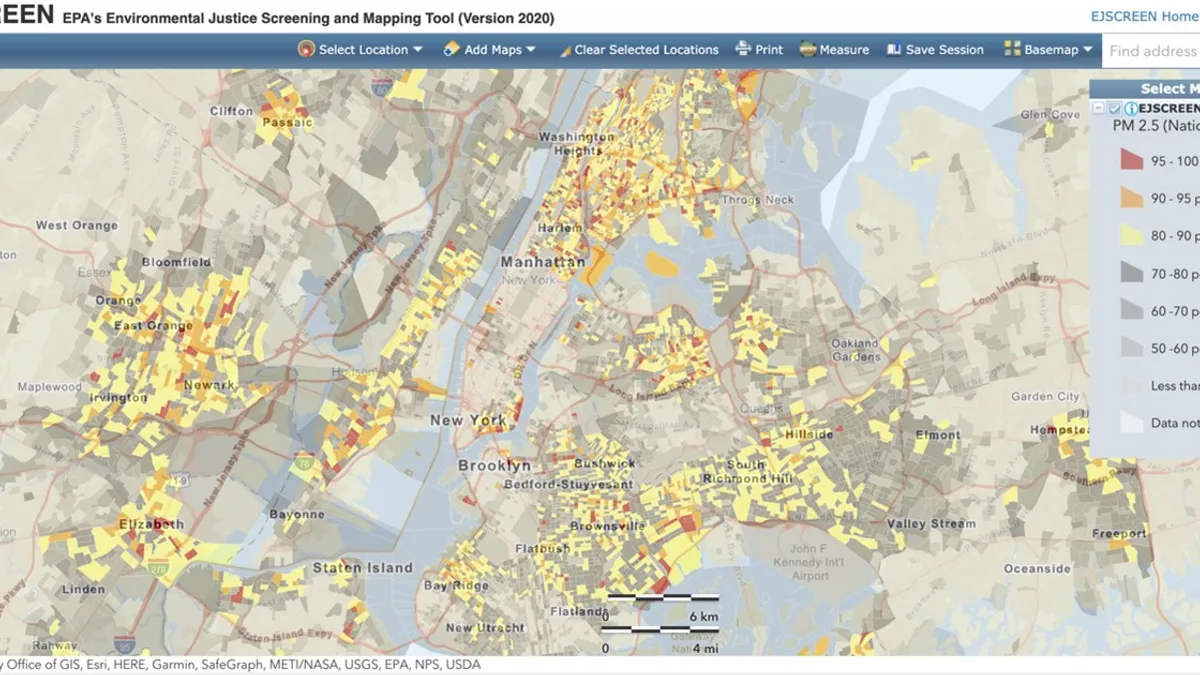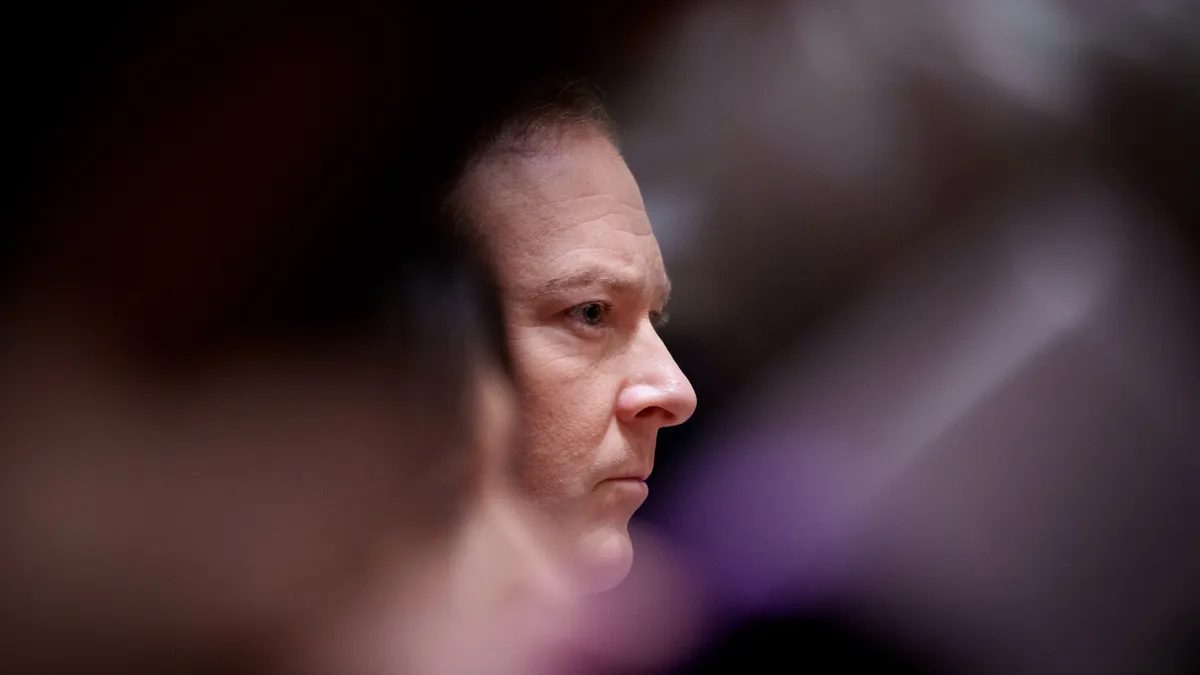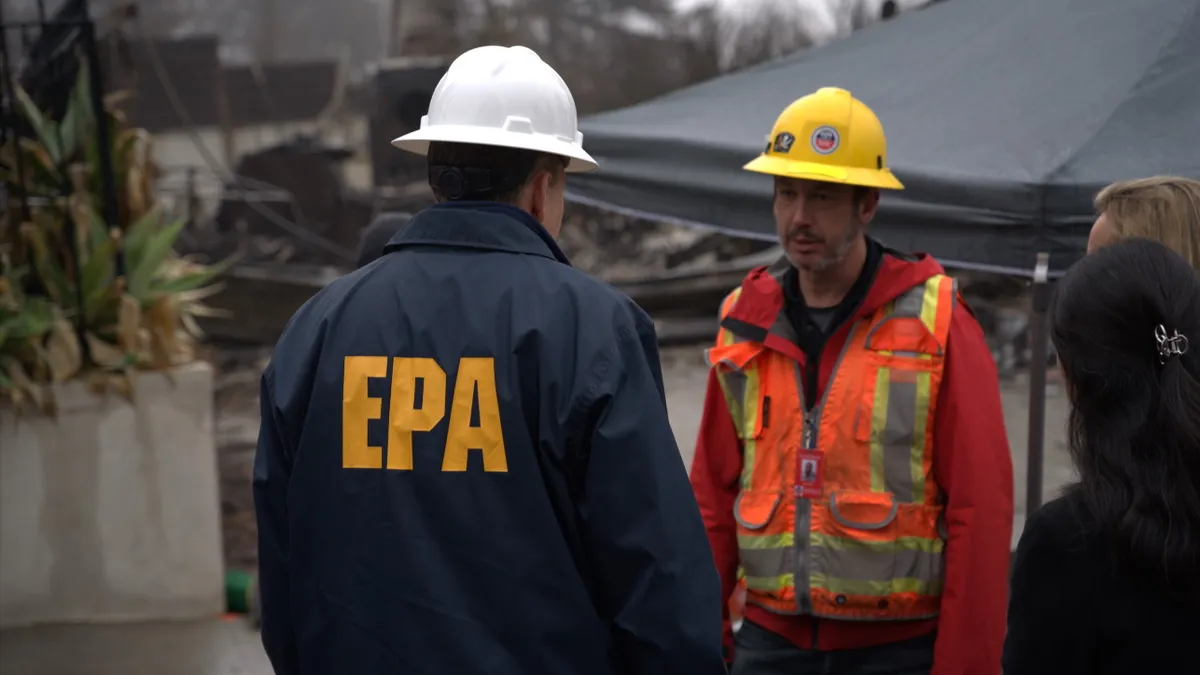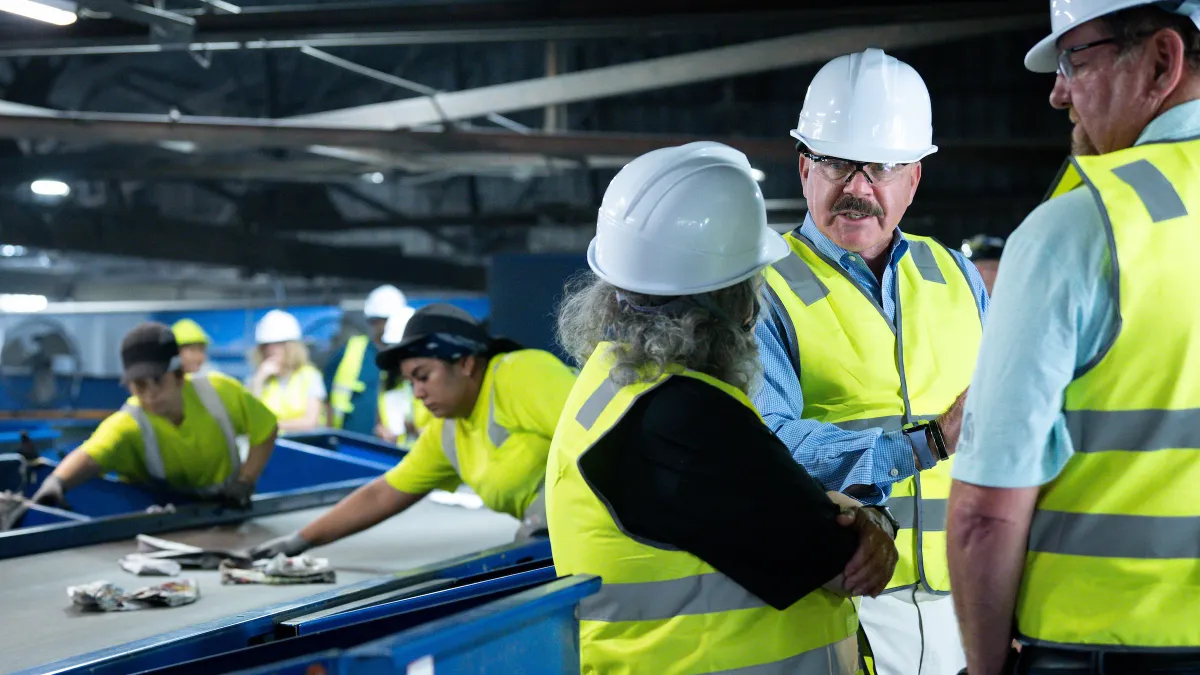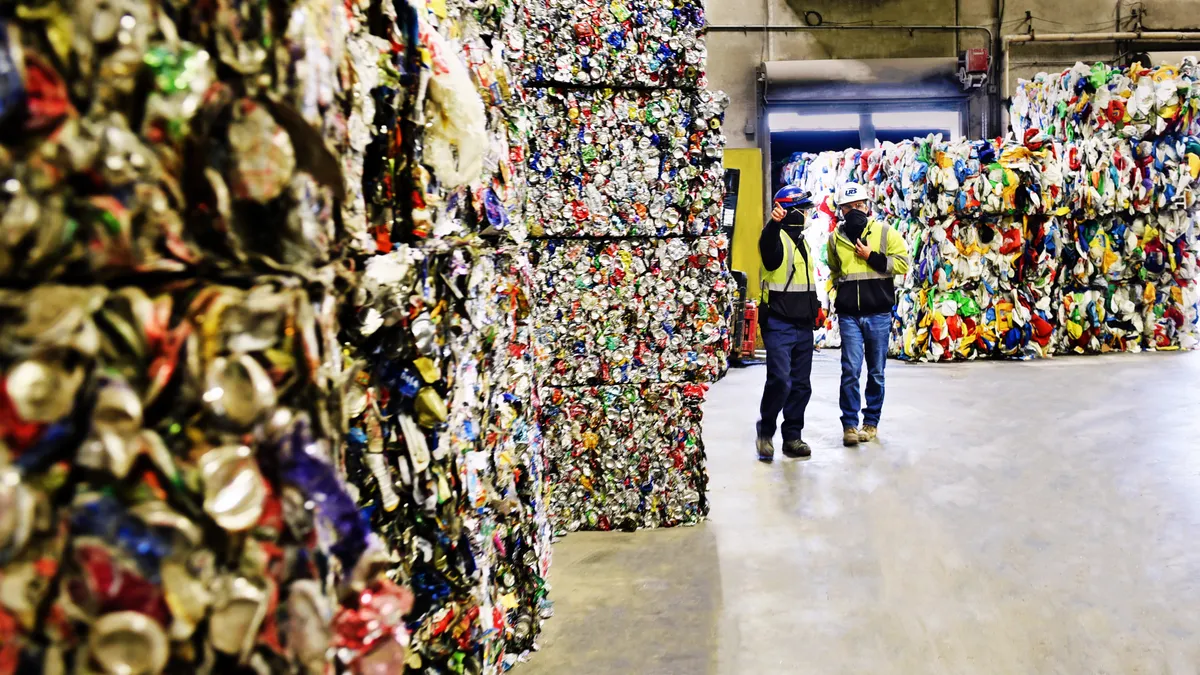UPDATE: October 6, 2021: Gov. Gavin Newsom signed a full slate of recycling and waste-related bills into law on Tuesday. “California’s hallmark is solving problems through innovation, and we’re harnessing that spirit to reduce the waste filling our landfills and generating harmful pollutants driving the climate crisis,” he said in a news release.
The most high-profile bill, SB 343, will prohibit packaging from including the "chasing arrows" or other recyclability claims unless approved by a specific state agency process. Other bills signed relate to labeling requirements for compostable packaging, restricting plastic scrap exports and updating portions of the state’s beverage container deposit system. Supporters such as Californians Against Waste, the National Stewardship Action Council and Oceana applauded Newsom's decision.
September 14: California's legislative session has come to a close, and recycling industry advocates expect Gov. Gavin Newsom to sign a full list of bills meant to improve the quality of the state's recycling and organics streams and align the state with international trade agreements.
Though the volume of approved legislation isn't as large as in 2019, "this year has been a banner year for waste and recycling management bills specifically," said Heidi Sanborn, executive director of the National Stewardship Action Council (NSAC), which advocated for numerous bills this session.
Many of the bills were written with direct policy input from California’s Statewide Commission on Recycling Markets and Curbside Recycling, a group created by a 2019 law. The 17-member commission issued numerous policy recommendations meant to help California reach its recycling and diversion goals, while addressing infrastructure issues and market development. Commissioners included representatives from city governments, environmental advocacy groups and the waste and recycling industry.
Sanborn, who also serves as the commission’s chair, said the diverse representation helped lawmakers write stronger bills with a better chance of passing than in previous years. With more people at the table and talking to each other, "you can reach consensus and have a greater understanding of each other," she said.
The end of the legislative session came just as California is set to conduct a recall election on Sept. 14. Those familiar with the election process believe that even if Newsom is voted out of office, he is likely to remain governor long enough to sign any outstanding bills on his desk by the Oct. 10 deadline. Any bills without his signature by that date will still become law unless he specifically vetoes them, but Sanborn and other advocates still worry a new governor may not make the recently passed bills as much of a priority.
Waste Dive rounded up the most notable bills from California's session, some with national implications. Did we miss any important legislation? Let us know at waste.dive.editors@industrydive.com.
| Bill Number | Highlights | Bill Status |
| SB 343 | Prohibits packaging from including the “chasing arrows” or other recyclability claims unless approved by CalRecycle standards; prompts CalRecycle to produce list of commonly recycled items. | Signed by governor |
| AB 881 | California would no longer be allowed to count most exported plastic scrap toward its state recycling goals and most future exports are prohibited | Signed by governor |
| AJR 4 | Urges President Biden to sign on to Basel Convention | Chaptered by Secretary of State |
| AB 1201 | Updates the state's requirements for labeling certain compostable plastic packaging and requires it to be free of intentionally-added PFAS | Signed by governor |
| SB 619 | Ensures municipalities won't yet be subject to fines in 2022 if they have not fully complied with new organics recycling regulations under SB 1383 | Signed by governor |
| AB 962 | Allows refillable beverage containers to be returned and washed for reuse as part of the state's redemption program, instead of being crushed | Signed by governor |
| AB 1311 | Allows certified bottle bill redemption centers to change hours based on community need; also allows container bag drops and pays customers electronically | Signed by governor |
| AB 1276 | Prohibits full-service restaurants from providing single-use plastic straws or foodservice ware unless the customer requests it | Signed by governor |
| SB 54 | Requires all single-use disposable packaging, including food service packaging, to be recyclable or compostable by January 2032 | Tabled for 2021, but advocates predict an updated version could return in 2022 |
| AB 661 | Updates the State Agency Buy Recycle Campaign with new recycled content standards for materials purchased by the state of California | This two-year bill did not pass in 2021, but is expected to return in 2022 |
| SB 289 |
Requires producers of batteries and battery-embedded products to establish a stewardship program for collection, transportation and recycling |
Held in committee; advocates anticipate bill could return in 2022 |
Heading to the governor or finalized
SB 343: Recyclability claims on packaging
One of the year’s most-discussed bills, SB 343 would prohibit packaging from including the "chasing arrows" or other recyclability claims unless approved by a specific state agency process. Supporters expect Newsom to sign it despite opposition from plastic industry groups that worry the bill will result in more items entering the waste stream.
Under the bill, a product could only be labeled recyclable if it is collected in at least 60% of the state’s curbside programs and sorted into specific streams at facilities that meet international Basel Convention standards. The bill would require CalRecycle to publish a list of materials that are most commonly collected at recycling facilities by Jan. 1, 2024. After that, manufacturers would then have 18 months to make sure their products comply with the list or fix any language or labeling the state deems misleading or deceptive. Products recycled via non-curbside programs could also be certified under separate standards.
Supporters say the bill could have the potential to influence national packaging and recycling policy because it affects manufacturers that sell items to the state’s 39 million residents. "That represents a significant portion of the country,” said Jan Dell, founder of The Last Beach Cleanup and a member of the state recycling commission. The commission advocated for "truth in labeling" in its report.
Oregon has already passed legislation creating its own truth in labeling task force meant to determine whether packaging sold in the state includes potentially "misleading or confusing claims" about whether certain products are recyclable.
Supporters such as the NSAC and Californians Against Waste (CAW) see California's bill as the flagship in a package of circular economy bills meant to improve recycling quality and reduce consumer confusion, but the bill has a significant list of detractors, including PLASTICS.
"We urge the Governor to veto this misguided legislation and work with all stakeholders on commonsense solutions to reduce plastic waste, such as increasing investment in recycling infrastructure,” said Matt Seaholm, vice president of government affairs for the association, in a statement.
AB 881: Plastic waste exports
Under the bill, which was recently presented to the governor, California can no longer consider most exported scrap plastic to be classified as "recycled" as part of the state's goal of 75% of waste to be diverted from landfills through source reduction, recycling and composting. Instead, low-value plastic exports must be labeled as “disposal.”
The bill also came out of the commission, and its supporters said the state could not track whether the plastic was actually being recycled once it left the country. Much of the material is mixed-plastic bales containing low-value material that’s hard to recycle in the United States and was often sent to countries without strong recycling systems, they said. Supporters include Californians Against Waste, the American Chemistry Council and environmental groups.
Assemblymember Lorena Gonzalez, the bill’s sponsor, said AB 881 makes California’s waste and recycling practices more “honest and transparent” and reduces the chances of illegal dumping. “We can’t cut corners when it comes to tackling the plastic pollution crisis. Sending our plastic waste to another country to become someone else’s problem is dangerous and only causes more harm to the planet,” Gonzalez said in a statement.
AB 881 still allows for some plastic to be exported, provided exporters respect the contamination limits set forth by importing countries.
Dell said many California MRFs are not able to achieve low contamination thresholds required by countries like Malaysia and Indonesia, effectively barring such exports. Dell hopes the bill significantly reduces marine litter, and thinks it may help further develop domestic markets for plastic scrap while giving developing countries room to cultivate their own recycling economies. “California should not be exporting any plastic waste to non-OECD countries — it ruins the business case for collection and recycling in their own countries,” she said.
The bill also follows recent international scrutiny over plastic exports worldwide in the years since China, once the world’s biggest importer of plastic scrap, banned imports of the material in 2018. Recent changes to the Basel Convention, an international agreement that aims to ensure certain waste is handled responsibly, also began regulating scrap plastic shipments this year.
AJR 4: Basel Convention ratification
Though several California bills this year reference the power of the Basel Convention to curb the export of low-value scrap plastic to developing countries, the United States is not a party to the agreement. AJR 4 calls for President Joe Biden to ratify the Basel Convention.
State lawmakers and activists, including bill sponsor and Assemblymember Cristina Garcia, say ratification would help curb the export of certain types of plastic pollution from U.S. ports, particularly in California, which the Basel Action Network says is responsible for about 27% of “plastic waste.”
The call for ratification is part of a larger nationwide effort by NGOs to include U.S. waste export issues as part of the president's environmental platform, but some say AJR 4 does not have the power to hold the president to any promises.
AB 1201: Compostability claims for compostable plastics
The bill adds to the state’s existing rules for labeling items as compostable or biodegradable only if they meet specific standards. This update prohibits the sale of plastic products labeled with the term “compostable” or “home compostable” unless the product has a certification from the Biodegradable Products Institute (BPI), the Compost Manufacturing Alliance, or another third-party certification entity CalRecycle approves. Supporters include NSAC, as well as several recyclers and waste haulers.
The material must also be considered an “allowable organic input” under U.S. Department of Agriculture standards by Jan. 1, 2026, and must not contain “intentionally added” perfluoroalkyl or polyfluoroalkyl substances (PFAS). The updated rules also require compostable plastic to be labeled to more clearly distinguish it from a noncompostable or nonbiodegradable product “upon quick inspection.”
Rhodes Yepsen, executive director of the BPI, said the organization supports AB 1201 because it will help CalRecycle fight greenwashing in how labels and colors are used on products, and it will “ensure compostables are associated with food scraps and other feedstocks that composters accept, which has long been a BPI requirement.”
However, Yepsen said product producers might find it challenging to comply with new rules that require the products must be accepted as inputs in compost used on organic farms. “BPI helped negotiate a timeline that will hopefully allow enough runway to work on the necessary changes to make this happen at the USDA.”
The bill received opposition from the Rural County Representatives of California, which applauded the intent to make it easier for consumers to determine what types of products are compostable, but said it has “grave concerns” that local governments and customers would have to pay higher costs to comply with new organic waste sorting and processing requirements.
SB 619: Organic waste reduction regulations
The bill is meant to assure municipalities that they won’t be immediately hit with fines if they do not comply with organics diversion requirements that take effect in January 2022 under existing law SB 1383. This new law would allow jurisdictions that continuously violate SB 1383 regulations to receive temporary relief from penalties in 2022, as long as they submit to CalRecycle a notice of intent to comply and implement a corrective action plan.
SB 1383 calls for jurisdictions to establish organics recycling programs and meet a number of other requirements, and multiple local governments say they're worried about racking up fines if plans aren't fully ready by January. While the law was signed in 2016, critics say they've only had 14 months to develop plans since final regulations were not adoped until November 2020 and the pandemic has also limited their plans. However, bill opponents argue that municipalities had years to prepare for the law's broader requirements and note existing state laws already required certain types of organics recycling programs.
AB 962: Reusable beverage containers in the bottle bill
This measure, also influenced by the state commission recommendations, allows refillable glass bottles to be included in California's container redemption program if the processor sends the empty container to a CalRecycle-approved washer. The container can then be refilled by beverage producers, such as breweries, instead of being crushed. The bill would also provide bottle washers with the same processing payment currently paid to certified recyclers. The bill language cleans up a fraud-prevention clause in the state’s current bottle bill language that requires returned containers to be crushed so a single container can’t be redeemed multiple times.
Supporters see the bill as a small fix that could lead to major changes in California’s bottle deposit system, effectively “paving the way for returnable beverage bottle systems in California,” said CAW, a major supporter, in its bill analysis. Some activists also see the potential for California to eventually have a robust returnable bottle deposit system similar to the one in Oregon, and the state recently tested out a refillable glass container pilot program in Sonoma County.
Supporters such as the Container Recycling Institute say returnable glass bottles use about 93% less energy, and reusing the bottles reduces emissions compared to manufacturing new ones.
AB 1311: Beverage container redemption location updates
This proposal updates California’s bottle bill to allow certified recycling centers or bottle drop locations to be open during more flexible hours and make access more convenient. Previously, all certified recycling centers or locations had to be open for business at least 30 hours per week, with a minimum of five hours of operation occurring at night or during weekends. The bill also allows a “bag drop” recycling center — a location where residents can drop off bags of empty containers — to operate as a certified facility, which supporters say will be more convenient for residents in rural areas. Customers will be able to drop off beverage containers and receive refunds electronically within a three-day period.
The bill is seen as a small but important change to the state’s bottle bill program, which has struggled to offer more convenient ways for residents to return containers as more and more redemption centers close, Sanborn said.
Advocacy group Consumer Watchdog said in a statement that both AB 1311 and AB 962 "add something to the [bottle bill] program, but do nothing to fundamentally reform it." The group strongly favored SB 38, which would have required beverage container distributors to form a stewardship organization to handle the deposit program, helping fund redemption centers and other aspects. SB 38 failed to gain traction this year.
AB 1276: Reducing single-use food serviceware
The bill expands California’s existing plastic straw-on-request law to include other single-use serviceware, such as utensils. The bill applies to most restaurants, take-away counters and third-party delivery platforms.
What's next?
Several bills didn’t make it through the legislature in 2021, but advocates expect to see more movement on recycling and waste-related legislation when lawmakers return in January.
Sanborn said there could be more to come on SB 54, a controversial packaging bill that failed to move forward earlier this year when state Sen. Ben Allen tabled it in May to negotiate further with stakeholders, hinting that the bill could return after revisions. The bill would have required all single-use disposable packaging, including food service packaging, to be recyclable or compostable by January 2032. More than two dozen groups, including packaging manufacturers, opposed the bill, as has been the case for multiple years.
Lawmakers are also expected to take up AB 661, a two-year bill meant to update California's State Agency Buy Recycled Campaign, which directs state agencies to buy products with recycled content.
Sanborn also believes that SB 289, a bill meant to require producers to create or join stewardship organizations for batteries and battery-embedded products, will come “back with a vengeance” in 2022. The bill also aims to help curb battery-related fires, which can happen when batteries are not properly disposed or recycled.



